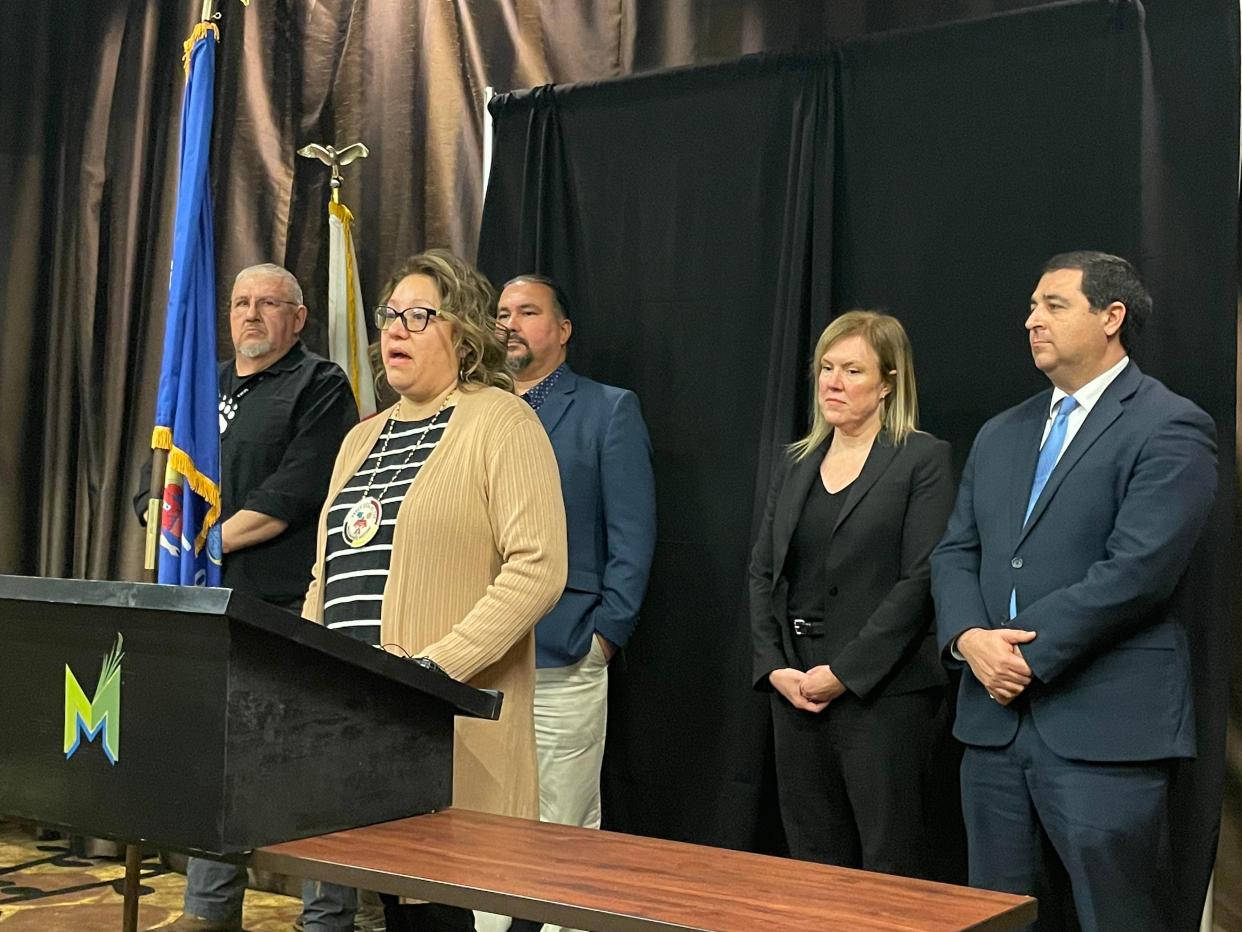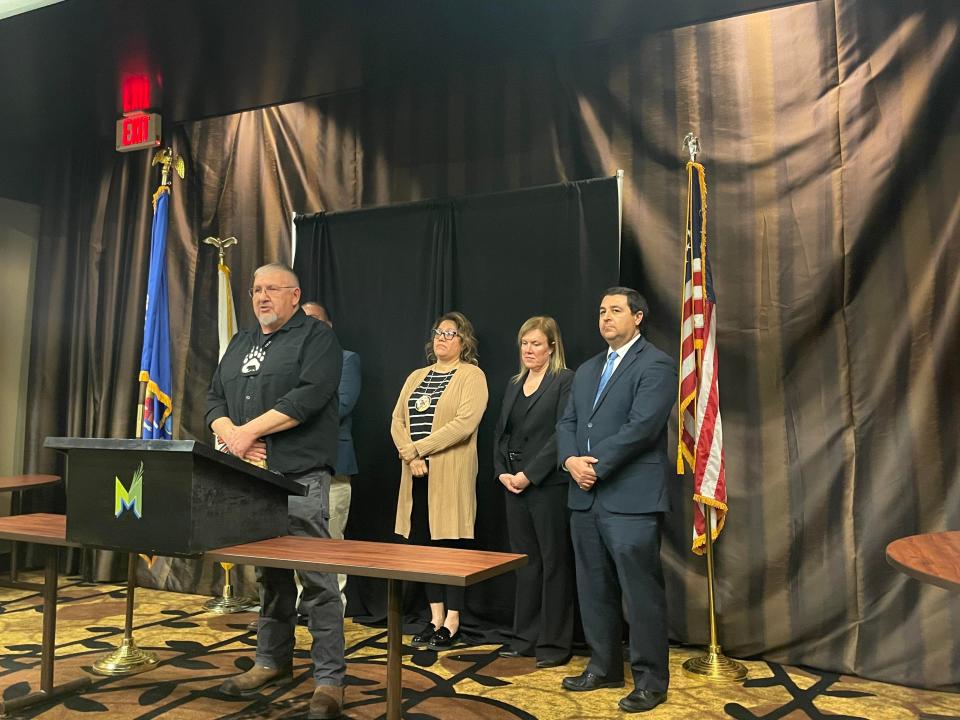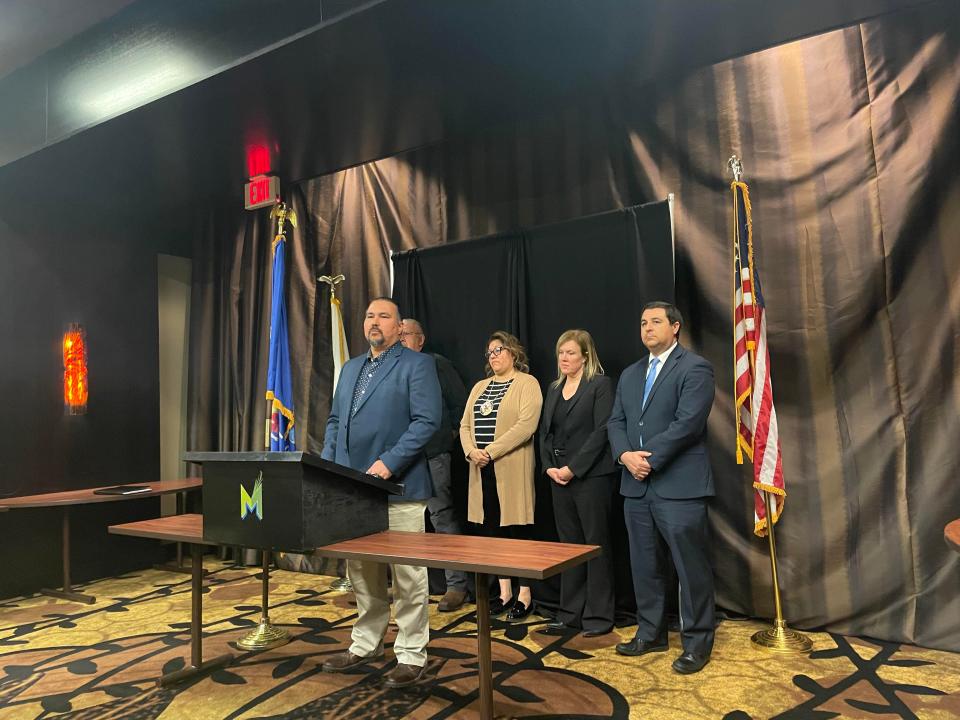Opioid deaths among tribal nations are 3 times the state rate. Can anything ease the epidemic?

KESHENA – It's a point of pride for the Menominee Nation that the lushness of its more than 235,000-acre forests can be seen from space, but it's an epidemic of opioid abuse that looms large across the tribal nation the more you zoom in.
Opioid overdoses in Menominee County are more than 11 times the state rate and more than 18 times the northeastern region's rate, according to ambulance data from the Wisconsin Department of Health Service. In December alone, the rate of ambulance runs in Menominee County was 21 times that of the state and more than 27 times the northeastern region. Opioid overdose deaths in Menominee County are nearly four times the state rate.
The loss and rupture of tribal lives frustrates Menominee Chairwoman Gena Kakkak, who noted the county has the lowest health outcomes of any of the state's 72 counties.
"It's frustrating. It's nothing that our council, our department, our director can handle," Kakkak said. "This is a community issue that we need to address. We declared a state of emergency in March of 2020 and we've been ongoing, having our team work tirelessly to make sure our services and our needs are met."
The Menominee Nation isn't an outlier either. Tribal nations in Wisconsin are losing people at nearly three times the rate of the state to opioid overdose deaths.
As the opioid epidemic continues to upend tribal nations, state and tribal leaders are working on solutions to end opioid overdose deaths and restore community health.
In a roundtable organized by DHS' harm reduction campaign Dose of Reality, Attorney General Josh Kaul and DHS Secretary-designee Kirsten Johnson met with Oneida Tribal Chairman Tehassi Hill, Menominee Chairwoman Kakkak and Lac du Flambeau Ojibwe Tribal President John Johnson at the Menominee Casino for a frank discussion on what these needs look like.
What was discussed at the Dose of Reality roundtable?
Kaul said he, Kirsten Johnson and members of Wisconsin's federally recognized tribal nations discussed the use of money from a legal settlement with drug manufacturers for aggressively and deceptively marketing opioids to prescribing doctors. More broadly, they also talked about efforts to respond to the opioid epidemic, including intervention and prevention efforts.
Part of the discussion considered non-traditional forms of prevention and intervention, emphasizing culturally specific forms of treatment and education.
But nothing, it seems, has been enough to stem the tide of opioid overdoses, said Kakkak.
"Our nation is in crisis. We have the services, we have the data, we have the action plan, we've created a drug intervention team, we've been under a declaration of emergency since March of 2020," Kakkak said. "And it's not enough, no matter how much work and how much time and services that we put into it."
John Johnson, Lac du Flambeau Ojibwe president, also expressed worry that opioid use is starting younger and younger, with some users starting as young as fifth grade.
The crisis has sapped an already limited tribal law enforcement agency, John Johnson said. Every year, the tribal police make at least 800 arrests related to opioids, he said, a striking number considering the reservation's total population: approximately 2,400.

Why are tribal lands hit harder by the opioid epidemic?
Reservations, primarily located in rural parts of the state, tend to be far away from robust resources. Economic opportunities are scarcer, affordable housing harder to find and health care options limited, Kirsten Johnson said.
Poverty hurts, and substance use is a coping mechanism, especially for tribal members, who have the highest rate of substance abuse and dependence of any ethnicity or race in the United States. Those socioeconomic factors are further exacerbated by racism, discrimination, historical trauma, violence and a mismatch between secular Western medicine and holistic tribal traditions, according to American Addiction Centers.
Generational trauma and, with it, the erosion of tribal knowledge, contribute to the psychic pain that makes quick relief that much more sought after.
Those deeply rooted pains loom over the basic needs with which many tribal members of Wisconsin struggle, Kirsten Johnson said.
What is the opioid settlement fund and how much is going to Tribal Nations?
When Kaul took office in 2019, he made it one of his top priorities to hold pharmaceutical companies accountable and any others who contributed to the opioid epidemic accountable for their role. Wisconsin was among the 15 states that sued Purdue pharma, the maker of the powerful prescription opioid OxyContin in U.S. Bankruptcy Court in White Plains, N.Y.
That, Kaul said Thursday, "yielded real results for Wisconsinites."
As part of the National Prescription Opiate Litigation, the state is due to receive $740 million in total funding through 2038. DHS administers 30% of the state settlement funds, Kirsten Johnson said and the remaining 70% goes to the 87 county and local governments, including tribal nations, across the state that participated in the opioid litigation.
In 2023, DHS received $31 million in funds, $6 million of which was distributed to the 11 federally recognized tribal nations with members in Wisconsin.
DHS received $8 million in 2024, and tribal nations and other organizations can apply for funding, which will help in the following ways:
Support the distribution of naloxone and fentanyl test strips;
Cover room and board costs for Medicaid members in a residential substance use disorder treatment and;
Support the cost of medication-assisted treatment for people with an opioid use disorder.
What do the local needs look like?
People in the Menominee Nation are losing loved ones all the time, either to opioid overdose death, incarceration or estrangement, Kakkak said. That especially impacts young people, who end up being raised by grandparents, great-grandparents or other family members.
Kakkak wants to see more services geared toward mental health as they grow up with these traumas.
Additionally, the Department of Justice oversees the Treatment Alternatives and Diversions, or TAD, programs, which many tribal nations participate in, Kaul said. The programs provide district attorneys or judges with options for offenders to voluntarily commit to substance abuse treatment, case management and other risk reduction services.
The idea is to break the cycle of addiction-to-conviction. Putting somebody with addiction in jail isn't an effective approach if the underlying issue isn't addressed, Kaul said.
"There's been a lot more recognition over the decades that addiction is a disease," Kaul said. "It's not simply a law enforcement crisis. It's a public health crisis. It impacts every community."
TAD can lend itself to some of the more holistic solutions. When people have access to affordable housing, transportation to receive treatment and behavioral health services, and supportive communities, they're much more likely to succeed, Kaul said.
What will funding support?

Hill, from Oneida Nation, said its focus is on developing medication-assisted treatment, which combines medicine — such as methadone, buprenorphine, and naltrexone — with counseling and other therapies.
"When people are thinking of making that change in their life, we need to be there at that second to be able to hold their hand and get them to the next step of recovery," Hill said.
Lac du Flambeau has a healing-to-wellness court, John Johnson said, which provides a combination of substance use and behavioral health treatments, in addition to education and supervision. It's guided by cultural principles of Ojibwe.
Collaboration is also opening up throughout the Ojibwe territories, which span segments of Wisconsin, Michigan, Minnesota, North Dakota and Ontario.
"What I'm seeing, as the tribal president, is that the language is coming back, the culture is coming back and we're starting with the younger and younger ones," John Johnson said. "We're trying to get them down that right road, the red road that they have to follow."
What's next?
Kirsten Johnson emphasized that no amount of money can make up for the grief and loss of community members. However, dollars from the state opioid settlement will be coming in yearly for a long time. It's an opportunity, she said, to respond through collaboration with tribal partners.
"I'm hopeful that we can have some strategic strategy and invest very intentionally into our tribal nations, but also into the entire state of Wisconsin," Kirsten Johnson said. "We really want to address substance use disorder, but also mental health and trauma."
Natalie Eilbert covers mental health issues for USA TODAY NETWORK-Wisconsin. She welcomes story tips and feedback. You can reach her at neilbert@gannett.com or view her Twitter profile at @natalie_eilbert. If you or someone you know is dealing with suicidal thoughts, call the National Suicide Prevention Lifeline at 988 or text "Hopeline" to the National Crisis Text Line at 741-741.
This article originally appeared on Green Bay Press-Gazette: Opioid epidemic upending Wisconsin tribes, as deaths continue climbing

